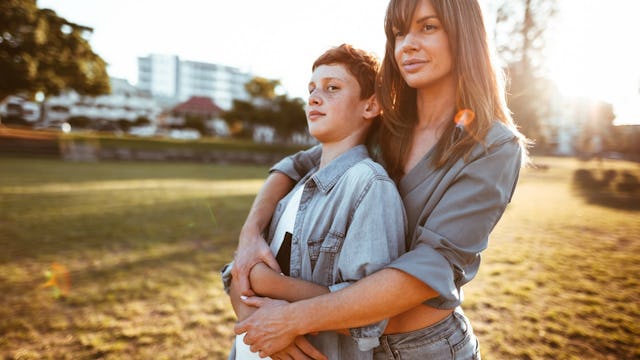12 Is The Age When Everything Changes

My youngest child turned 12 last November. During the months leading up to his birthday, I looked for signs of change but didn’t see any evidence to support what happened to his older brother and sister around this age.
For the two of them, it was like clockwork — they morphed into two humans I barely recognized just before turning twelve.
They used to tell me about their day and want to share pieces of their social life, like who they sat with at lunch and if their best friend hurt their feelings. Then suddenly, they started responding to me with shoulder shrugs and mutters.
They used to get excited about going for family bike rides and ice cream cones, but that all flew out the window when they turned 12 — their enthusiasm replaced by video games, spending time alone in their room, or wanting friends to come over.
Instead of becoming more aware of people, their surroundings, and how their actions and tone of voice affected others, they seemed to notice less.
And their moodiness left me grabbing for every book I could get my hands on about the teenage brain.
Were they depressed? Was this normal? Am I doing enough to help them? How did I raise such ungrateful kids?
Then I talked to about a dozen other parents who all agreed — 12 is where everything changes.
Sure, I remembered being a teenager and hating my life at times. My social life was front and center and came before anything else, including outings with my mom. I thought my parents were dumb and I knew way more about life than they did, but I hadn’t been this bad … had I?
According to my mother, I was. And it started around my 12th birthday.
I celebrated my son on his 12th birthday in his way. He didn’t want a party with his friends. He wanted chicken nuggets and french fries. And he wanted to have his cousins, aunts and uncles, grandmother and father all in one place to eat peanut butter pie. So, that’s what we did.
He asked for a mini-telescope, and wanted to walk around Target to pick out some Flarp slime and he somehow talked me into letting him get a whoopie cushion. I was so consumed with the fact he was still the same child he’d always been, feeling hopeful that he wouldn’t go through the Terrible Twelves like his brother and sister did, that I’m sure he could smell it.
He was still very much a child who liked to talk. He still hugged me. He still thought I was awesome and wanted to spend time with me.
This is 12 for him, I thought. And I was clinging to it.
And then, overnight, he changed.
Instead of wanting to watch a family movie and make popcorn (one of his favorite things to do), he started staying in his room for hours. I’d check on him and find him lying on the floor doodling in his notebook or lost in thought staring at the ceiling. He became annoyed when I asked him if everything was all right.
“I just want to be alone, Mom,” he’d tell me.
There was a time in my life when my kids were up my ass all the time and, honestly, having a kid tell me they wanted to be alone would have sounded like a dream at one point. It would have been my pleasure to go to the bathroom by myself, eat an entire sandwich without their hands grabbing at me, or not have to help them find the tiny, missing LEGO piece.
But then they grow up. They turn 12. They start actually asking you to leave them alone. Nothing about that feels natural to you as a mom, and I don’t like this phase at all.
Screw you, 12.
I miss the eagerness my kids used to have. I’d give anything to see them run around the house like their hair’s on fire because we are going to get a Happy Meal.
I’d rather lose sleep because they’re sick, had a bad dream, or don’t want to sleep alone than lose sleep staying up worrying about their well-being because they are quiet, moody, or seemed on edge after school.
Twelve has a way of taking your kids and trying to squeeze the child out of them.
Twelve is confusing.
Twelve is lonely.
Twelve is asking your kids to change before they are ready.
Twelve forces you to learn how to parent in a whole different way.
Twelve has grit and endurance. It’s relentless and makes you feel like you have been bolted out of their lives.
But one thing I see in my two older kids, who will be 16 and 14 this year, gives me hope: They are coming back around.
They’ve started talking more and letting me peek into their lives again without me having to constantly ask for it.
Their hugs feel sincere. They have ventured out of their rooms more. And their moods have leveled out to a manageable level.
It took a few years, and I will miss my youngest as he navigates his way through his 12th year (and probably most of his 13th), but he knows I will be waiting for him on the other side of this.
So, if you are a parent with a child who is approaching their 12th year, or are smack dab in the middle of it and wonder when they are going to come out of it, I promise you, it will get better.
But in the meantime, do your best to not take it personally. Do what you feel is right as their parent, and treat yourself to some comfort food once in a while (even if they don’t want to eat with you). These are the best elixirs I’ve found so far.
This article was originally published on